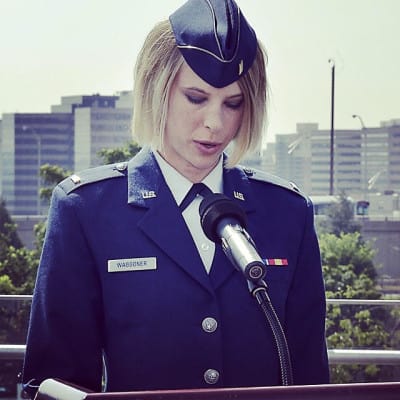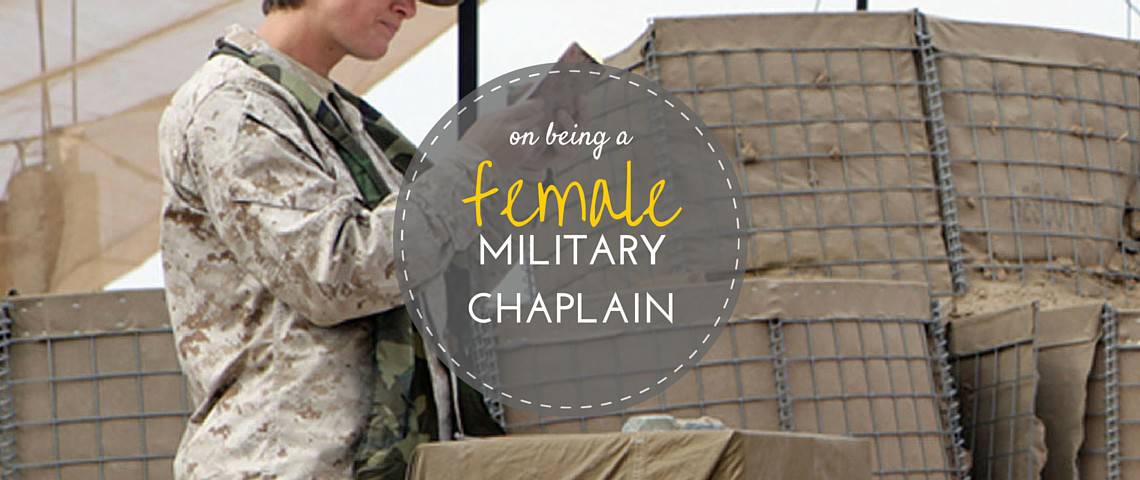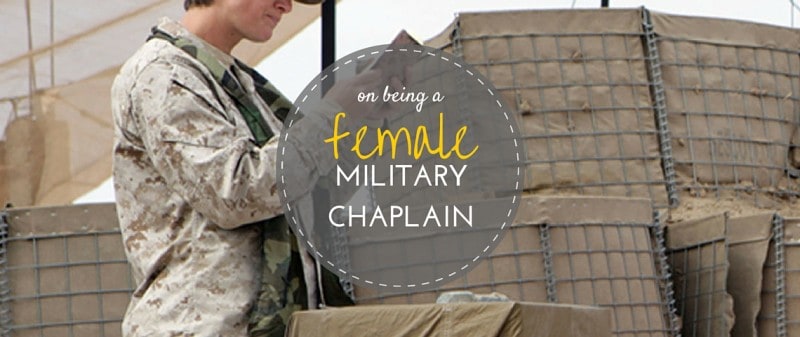I just spent six weeks with a group of 21 other Air Force chaplains. All 21 were male. I’m a female chaplain in the Air Force Reserves (which means I serve a minimum of about 30 days per year at my base) and the six weeks were spent at a training assignment fulfilling educational requirements.
In no way do I equate myself with female trailblazers in the military (like the first female Rangers), or female trailblazers in ministry. However, as the solo female chaplain among a class of 22 I couldn’t help but have thoughts of gender, equality, and ministry.
It was suggested to me during this course that I shouldn’t “draw attention” to the fact that I’m a woman. I should be clear: this was said not as a way to quiet my opinion or invalidate what I have to offer. Rather, to refrain from calling out my specific uniqueness in the group. I have mixed feelings on this.
As I develop my theology of chaplaincy, I find that I’m drawn to components of liberation theology. Serving the God of the oppressed, the God of liberation, requires me to cry out on behalf of the marginalized. I haven’t found my personal experience as a female in the military particularly oppressing – there have been moments, and people, but overall I haven’t. But certainly a number of women have. I became a chaplain to serve them and if I keep silent on such a fundamental thing as my existence as a woman, how can I inspire others?
Chaplains are consistently reminded that we are “visible reminders of the holy.” And I add in another qualifier for myself:
 I am a visible reminder of the feminine holy.
I am a visible reminder of the feminine holy.
Because the fact is, even in my brief few years as a military reservist, attention is continually drawn TO me, BECAUSE I am a woman; a woman in the military and a woman in ministry. There are things I’ve learned to consider because of these designations that put me squarely in the minority (again, nothing like the minority of being a female Army Ranger for example, but a minority none-the-less).
And yet I wonder about a Pauline theology of being “all things to all people.” The ethos of the military is community, brotherhood (<— intentional use of gendered language!), service, mission. Would I serve better if I did focus more on cohesion than on developing an identity as a female chaplain?
Of course, I will be a female chaplain no matter what I do. People will still single me out (for good and bad). I will still be a visible reminder of the feminine holy. I will always offer my perspective and hope it inspires people – my chaplain colleagues and the airmen I serve – to think in new and different ways.
I’ve written before about my ideal world: An existence where the designator “feminist” will become obsolete because equality of opportunity and position among the genders will be a guaranteed given. Will I serve people better if I operate as if this is already the reality (while still working to make it so as much as I can)? Or will I serve better to call attention to our deficiencies and challenge people to make it part of their reality?
The best answer I’ve come up with so far is contained in one word: Context. While it’s good to have a general framework in mind, no one theology of ministry can cover all the encounters I will face.
I might need to put on my feminist hat sometimes, or my liberation theologian hat, or simply my military officer hat. Perhaps this is a truer expression of “being all things to all people.”
~~~~~~~~~~~~~~~~~~~~
See also Women, War, and Evangelicals.
This post first appeared on The Acropolis Project.





13 responses to “On Being a Female Chaplain in the Military”
“I became a chaplain to serve them and if I keep silent on such a fundamental thing as my existence as a woman, how can I inspire others?”
Exactly. Even if you are not particularly feeling excluded or marginalized, you can still identify with people who are oppressed because of gender. It’s one of the best things you bring to the job.
Thanks for the work you do–both caring for people and encouraging all of us to think about, and wrestle with, our theology.
Thank you, Alexis, for sharing this. As a school chaplain, my experience couldn’t be more different – of my hundreds of colleagues in the Australian state in which I live, the majority are women. As a rough guess (a very rough guess!) I’d say it’s about a 70/30 or even 80/20 split between the genders.
I pray you will have a long and fruitful ministry.
PS Love your little girl’s name!
Thanks for your comment! I’ve spent some time with school chaplains and in my (very) limited experience I would guess the breakdown is similar in the US – they are often women!
“While it’s good to have a general framework in mind, no one theology of ministry can cover all the encounters I will face.”
That’s a good reminder for all of us no matter what our ministry, Alexis. Thanks.
Hi Alexis,
You said:
“I’m drawn to components of liberation theology. Serving the God of the oppressed, the God of liberation, requires me to cry out on behalf of the marginalized. I haven’t found my personal experience as a female in the military particularly oppressing …”
This passage from your blog caught my eye for this reason:
Liberation Theology is defined as “a movement in Christian theology, developed mainly by Latin American Roman Catholics, that emphasizes liberation from social, political, and economic oppression as an anticipation of ultimate salvation.”
Since salvation comes clearly comes to us all by God’s grace through faith in Him only, and not through social, political or economic means ‘as an anticipation of ultimate salvation’ I found that this was a rather dangerous way of thinking, especially since the Bible ALONE teaches that God is a God of the oppressed and of liberation…One does not need any Liberation theology or any other theology in order to believe that God is a freedom Fighter and all the Bible clearly says He is. Do you not think that by bringing in a social theology it is muddying the waters?
As a theologian I see most things through the lens of theology. Yes, God, in Godself is the author of liberation and the ultimate liberator. But I find liberation theology helpful to remind me of this. I would argue it adds in a very here-and-now component which encourages people to cling to this knowledge about God in their efforts to fight oppression and bring God’s kingdom to earth.
I think theology done well helps us rightly think about and respond to who God is. I would even venture that we CAN’T rightly think or respond WITHOUT theology. It’s how we “do” our faith!
“I will still be a visible reminder of the feminine holy.” This is beautiful Alexis. Thank you.
Thank YOU for reading! So crazy to connect here!
Thanks for sharing your experience! -From another mom of a baby Iunia.
Love it! I know of a few baby Junia’s out there – I hope one day they all run into each other (and commiserate about their super nerdy moms :)). Thanks for your comment!
Well put! While you may not be the very first female chaplain, you are the first I’ve heard from. More power to you! as you continue to develop your multifaceted and “multi-hat” theology!
Thank you for the encouragement! Glad that I was able to lend a new voice to this discussion!